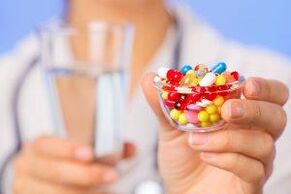
Prostatitis is a disease of the prostate, which can be very painful, but with the right integrated approach, the disease goes away. Let's take a closer look at the most famous method of drug treatment -use of antibiotics- What antibiotics should you take for prostatitis in men and which are the best?
Antibiotics
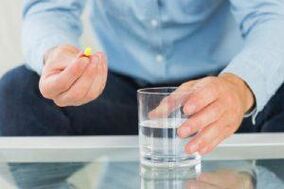
Treatment of prostatitis with drugs is usually limited to controlling its symptoms. Painkillers can relieve pain. Antibiotics are used for prostatitis in menfor patients with acute or chronic infectionprostate.
E. coli and other Gram-negative bacteria cause the most acute prostate infections.Symptoms include:groin pain, dysuria, pain during ejaculation, inability to urinate, as well as fever, general malaise.
The treatment for prostatitis in men is always antibiotics. Chronic infectious prostatitis may require long-term drug treatment and severe infections may require hospitalization where the drug is administered parenterally.
Further in the article, we will look at how to treat prostatitis in men with antibiotics.
Advantages and disadvantages
Antibiotics are always recommended if there is an infection or if the disease recurs within a year. Suitable for effective treatment:
- Acute infectious prostatitis?
- Chronic infectious prostatitis.
The benefits of medications include:
- Strongbactericidal properties;
- Bacteriostatic propertiesthat prevent the growth of bacteria.
- High performance- cover a wide range of infections;
- Ease of use. Most medicines are taken orally or by injection.
- A few side effects;
- economyMedications are widely available and inexpensive.
Disadvantages includesystemic side effects, which varies depending on the antibiotic selected and usually include:
- Diarrhea.Often, during treatment, there is an increase in blood sugar in the intestines, which causes intestinal dysbacteriosis.
- Fungal infectionsoral cavity, genitals.
- Formationkidney stones;
- Coagulation disorderblood (while taking certain cephalosporins).
- Sensitivity to light(when taking tetracyclines).
- Blood disorders("thick" blood syndrome);
- Deafness(rarely).
Common side effects also include:
- Abilityallergic reaction;
- resistance of certain bacteria. This happens if the patient receives an incomplete dose.
Types of antibiotics
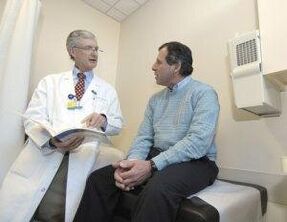
Most often, the patient is prescribed4-week course, but if the urologist suspects the presence of chronic prostatitis and the signs (as well as the pain) have not disappeared after a course of four weeks, he may recommend a larger dose.
Courses of up to three months are sometimes used.
Antibiotics for prostatitis in menprescribed by the treating physiciandepends:
- The causative agent that causes the infection.
- Forms of the disease (acute / chronic).
- The severity of the symptoms.
- General health of the patient.
- age.
And based on the results of suchanalyzes, how:
- Blood test - extended profile.
- General urine analysis?
- PCR (smears) of the urethra.
- Tank. urine culture;
- Prostate secretion analysis.
Types of antibioticsused in the treatment of prostate:
- macrolides?
- penicillins?
- Tetracyclines?
- Fluoroquinolones?
- Cephalosporins.
Which antibiotics are better and more effectivewith prostatitis? Consider the names of antibiotics for prostatitis:
| Composition | The effectiveness of the drug | Energy was done | Recommendations for use (more details in the instructions) |
|---|---|---|---|
| Macrolide drug | Effective against diseases of the urinary system (prostatitis, urethritis, cervicitis, epididymitis) | Slows down the active growth and reproduction of bacteria, has antiseptic and antimicrobial action, has bactericidal action | 1-2 g 2-3 r / day Release form: tablets of 10 pcs. 500 mg |
| Semi-synthetic drug of the macrolide group, erythromycin derivative | Effective for the treatment of chronic infectious prostatitis | Broad-spectrum antibiotic. It has a wide range of antimicrobial activity, many bacteria that cause prostatitis are sensitive to the drug (Streptococcus, Klebsiella, Escherichia coli, Staphylococcus aureus) | 0, 15 g 2 r / day before meals with plenty of fluids Available in capsules of 10 pcs. 0, 15, 0, 3, 0, 1 and 0, 05 g each |
| Tetracycline derivative | Effective for the treatment of infections such as acute / chronic prostatitis, chlamydia, gonorrhea, syphilis | It has bacteriostatic and anti-inflammatory action | With a meal with plenty of fluids 200 mg once, then 100 mg once a day Produced in the form of a capsule of 10 pcs. 100 mg |
| Semi-synthetic drug of the cephalosporin group | Antibiotic for the treatment of acute bacterial prostatitis in men. It is taken in the context of serious bacterial infections | It has antimicrobial, bactericidal action. Active against many microorganisms that cause prostatitis (streptococcus, Staphylococcus aureus) | It is administered intramuscularly or intravenously, 1 g every 8-12 hours Release form: in ampoules for injections of 0, 5, 1 or 2 g |
| Cephalosporin preparation (in the form of sodium salt) | Used for serious bacterial infections (prostatitis, epididymitis) | It has antibacterial, bactericidal action | It is administered intramuscularly or intravenously, 1-2 g every 12 hours Available in bottles of 0, 5, 1 or 2 g |
| Broad-spectrum semi-synthetic antibiotic of the penicillin and clavulanic acid group | The antibiotic is used for prostatitis, as well as for the treatment of gynecological infections, infections of the respiratory system. | Has bactericidal action on gram-positive and gram-negative aerobics / anaerobes | 1 tablet 250 mg (+125 mg) every 8 hours Produced in tablets of 15 pcs 250 + 125 mg |
| Semi-synthetic drug of the penicillin group | Used to treat infections of the urogenital system (urethritis, prostatitis, pyelonephritis) | It has antibacterial, bactericidal action | Antibiotic for prostatitis, injections given intramuscularly or intravenously, 500 mg 3 r / day or in the form of 500 mg tablets every 8 hours It is produced in ampoules for injections of 500 mg or in tablets of 20 pcs. 500 mg |
| Lomefloxacin hydrochloride | Used for prostatitis, chlamydia, pyelonephritis, urethritis | It has antibacterial, bactericidal action, is active against gram-negative microorganisms that cause prostatitis | Tablets within 400 mg 1 r / day Produced in the form of a capsule of 10 pcs. 400 mg |
| Fluorinated carboxyquinolone, a synthetic chemotherapeutic agent | The antibiotic is used for inflammation of the prostate | Active against bacteria such as streptococcus, staphylococcus, chlamydia | Oral tablet 250 mg between meals or before meals with plenty of fluids Produced in the form of tablets of 5 pcs. 250 mg |
| Antibiotic of the fluoroquinolone group | Infections of the urinary tract, pelvic organs, genitals | It has antibacterial, bactericidal action, is active against bacteria such as streptococcus, staphylococcus, chlamydia, enterococcus, mycoplasma | 1 tablet before meals 200-800 mg / day Produced in the form of tablets of 10 pcs. 200 mg |
| A drug from the group of tetracyclines | Used for respiratory infections, chlamydia, prostatitis, syphilis | Antibacterial, bacteriostatic action | 1 tablet 250-500 mg 4 r / day Produced in the form of tablets of 10 pcs. 250 mg |
Only the treating physician can decide which antibiotic complex is right for you.
If the antibiotic did not help with prostatitis, then you can go for itfolk remediesand try treating prostatitis without antibiotics. Here are some of them: pumpkin seeds and honey, propolis, propolis candles, dead bees, soda and hydrogen peroxide, as well as monastery tea, Ivan tea and onions. You can also buy a Chinese prostatitis patch.
Injections
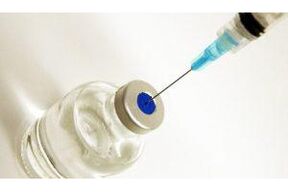
If the body does not respond to oral therapy, the specialist may prescribe parenteral administration (intravenous / intramuscularusually in the buttocks).
This method is also used to treat chronic / acute infectious prostatitis. It should only be considered after all other options have been tried, including oral antibiotic therapy for prostatitis, corticosteroid therapy and traditional medicine.
Parenteral administration is used if the patient has been taking several cycles of antibiotics for several months and all have been ineffective.
This reaction is due to the fact that infectious prostatitis is often caused by a local inflammatory process in the background of an autoimmune disease and oral medications do not have the desired effect.
What injections are given for prostatitis?
Antibiotics are commonly used for intravenous (and intramuscular) administration.3rd generation cephalosporin groups.The injections are given strictly in the hospital. After 5 injections, relief usually occurs.
Contraindications
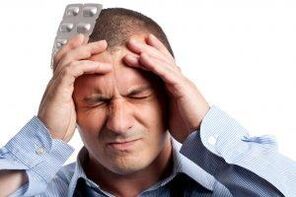
Contraindications usually depend on the drug, but more often include:
- Gastrointestinal disorders(especially when taking macrolide group drugs).
- allergic reactions (urticaria)
- Kidney and liver damage(usually in the context of taking penicillins, cephalosporins, macrolides).
- Childhood(with care up to 18 years old).
- Diabetes.
How to get
The tablet should be taken with 1. 5-2 glasses of water, the drug should be taken with meals (unless otherwise stated in the instructions) so as not to irritate the stomach. Drink after antibiotic treatmenta range of drugs to restore the intestinal flora.
Caution!Absolutely avoid alcohol during treatment.
Replacement
Infectious prostatitis is successfully treated with antibiotics, but if there are contraindications for introduction or if you have individual intolerance, hypersensitivity to certain components of the drug or when antibiotics do not help with prostatitis, the so-callednatural antibioticswith prostatitis. They are often less effective in fighting the infectious form of the disease. So what can replace antibiotics for prostatitis?
Most often usedechinacea, in its composition there is a special substance - echinacoside, whose properties are completely different from conventional antibiotics.
The plant prepares decoctions, infusions, decoctions, which allow you to relieve inflammation of the prostate without antibiotics.
It has a similar effectpoplar bark, called a "natural" antibiotic.
For the treatment of a bacterial form of the diseasealso appoint:
- alpha blockers;
- non-steroidal anti-inflammatory drugs.
- corticosteroids;
- 5-alpha inhibitors (slows prostate growth).
- Laxatives.
With timely medical care and a holistic approach to treatment, bacterial prostatitis can be completely cured with a single course of antibiotic treatment.





























